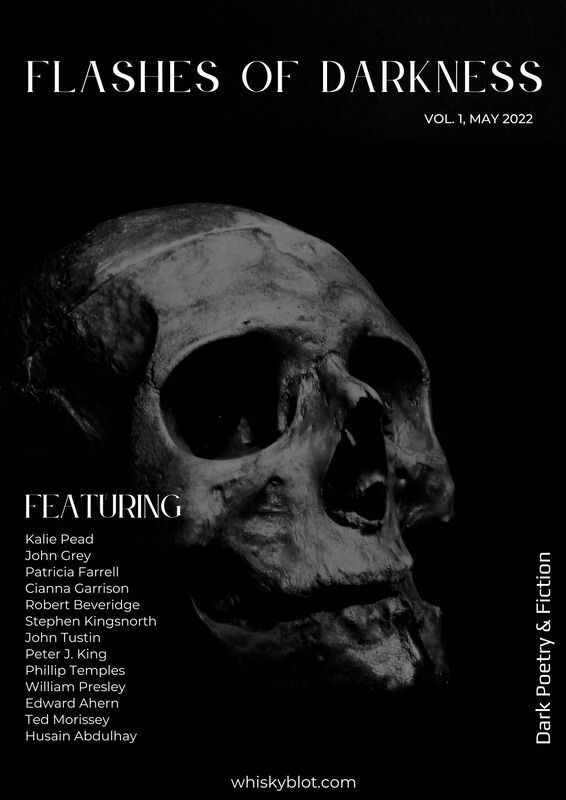|
i.
The thunder almost beats the lightning to me -- battering the house that shudders under their combined assault. I wait for sounds of shattered stone or glass, for smells of burning wood, scorched paint, of melting metal, violated air. The whole sky flashes, turns the world into a frozen negative in black and white, and leaves me blinded, vulnerable till I gain my sight again. And then the rain falls -- though it seems to join the clouds and ground with vitreous unbroken pipes that gush out gallons till the road’s in spate. I worry for the weeping windows, for the roof whose slates shift, shiver, held in place by moss and lichen and cold iron. The insistent fury of the storm stupefies my mind; it sweeps away both panic and delight, and leaves me empty, undefended, opened up to what the thunder says, the lightning shows, the rain recalls. And I am driven from the house, full pelt and unprepared, into the trees (which surely weren’t there yesterday), tripping over fallen branches, scratched and bleeding, fleeing fear in frantic darkness. ii. This might be a path, or just an accidental thinning of the undergrowth; I have to follow it in any case, and trace its faint meanderings beneath the dense dark canopy of yews. There shouldn’t be this undergrowth, in fact; the sun can hardly penetrate, yet here it is. And here I am... though where I am, I’m not entirely sure. I sense that there are animals and birds, but hardly catch a glimpse or hear a sound. I see the signs of people here and there – old footprints, dropped possessions – and occasionally on the breeze a few faint words. This might be a forest, but it feels more like a dream -- the clearings that I come to (sometimes bathed in rain, or hail, or snow; sometimes flooded with warm sunlight, blinding me for vulnerable moments) strain to tell me… tell me stories, maybe, fill in holes that leave my memory, my knowledge of myself, like lace. Once or twice I stumble on a long-abandoned hut, roof falling in, wood rotten, and around it gardens overgrown; neat rows of herbs and vegetables are swallowed by a mess of hybrid forms. This might be a metaphor; the forest still gets dark when night is falling, though -- but moonrise shows a thinning of the trees, a way out, as the frost begins to crackle underneath my cautious feet. iii. Rising from a dark-green tonsure, gleaming under snow, the summit’s still and silent, though the mountain is in torment, its heart bubbling with unimaginable heat. Upon the peak there is a tower; its white walls glisten as if made of snow, and sunlight flares reflected from its top. I’m not sure how I reach the tower’s foot, but when I do my feet and hands and ears are pierced by cold, my eyes ache, and my breath is short. I climb, I scrabble upward with my eyes fixed down, and as I lean against the rough stone whitewashed wall, I suddenly discover it’s a lighthouse. Or it was — its only light now glints from broken windows, and the door hangs open, letting snow drift thick across its stone-flagged floor. I stumble in and let myself collapse upon the stairs, sit sucking in the thin, cold air until I’m ready to explore. Slowly, scared that one misstep would send me tumbling, I make the long ascent. The winding staircase, steep and narrow, dark and chilly, passes through a storeroom, kitchen, bedroom, ending in the chamber of the lamp. Snow and shards of glass crunch underfoot, and yet the great lamp is intact. Neither reason nor experience, but some internal source of knowing pulls me to the stores of oil, guiding my unpractised hands in all a keeper’s tasks: the filling of the reservoir, the trimming of the wick, the cranking of the pump, the winding of the clockwork gearing, and the buffing of the glass. Then should come the spark of tinderbox, but I am beaten by the spinning of the Earth. Night doesn’t fall, it coils itself to spring, and darkness sinks its claws into the fleeing rump of day. My fingers tremble as they strike the flint; there is an age of fevered fumbling, until at last the lamp is lit. Across the forest all around the bone-white summit sweeps the beam, and I collapse, exhausted, sure that I have done what’s right, uncertain whether I have set a warning or a summons. Peter J. King was born and brought up in Boston, Lincolnshire. Active on the London poetry scene in the 1970s as writer, performer, publisher, and editor, he returned to poetry in 2013 after a long absence, and has since been widely published in magazines and anthologies. He also translates poetry, mainly from modern Greek (with Andrea Christofidou) and German, writes short prose, and paints. His currently available collections are Adding Colours to the Chameleon (Wisdom’s Bottom Press) and All What Larkin (Albion Beatnik Press); his booklet Ghost Webs is due out from The Calliope Script later this year. Web site: https://wisdomsbottompress.wordpress.com. Comments are closed.
|
ArchivesCategories |
Home Journal (Read More)
Copyright © 2021-2023 by The Whisky Blot & Shane Huey, LLC. All rights reserved.

 RSS Feed
RSS Feed